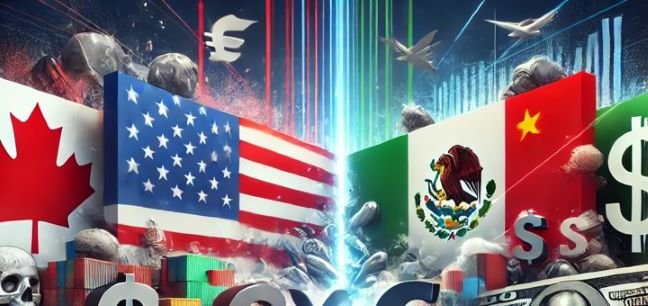US Imposes 25% tariff on imports from Canada and Mexico
The escalating trade war between the United States and its key trading partners, Canada and Mexico, has taken a serious turn following President Donald Trump’s announcement of sweeping tariffs. The move, which includes a 25% tariff on imports from both Canada and Mexico, along with a 10% tariff on Chinese goods, has sparked strong reactions from the affected nations. The tariffs, justified by the U.S. administration as a measure to curb illegal migration and the influx of fentanyl, have triggered immediate retaliatory actions from Canada and Mexico, setting the stage for a potential economic standoff.
Canada and Mexico Hit Back with Retaliatory Tariffs
Canadian Prime Minister Justin Trudeau swiftly condemned the tariffs and announced a countermeasure—a phased 25% tariff on $107 billion worth of U.S. imports. Trudeau warned that these trade restrictions would disrupt industries and lead to rising costs for American consumers, particularly in sectors like automobile manufacturing and energy. He also pointed out that key resources such as steel, aluminum, potash, and uranium—critical for U.S. security—could become less accessible due to the tariffs.
Trudeau further urged Canadians to support domestic industries by reducing reliance on American products. Provincial leaders in Canada echoed this sentiment, with some proposing bans on American-made alcohol and other consumer goods. Ontario Premier Doug Ford emphasized that Canada possesses significant leverage, particularly in critical minerals and energy exports, and vowed to use that influence to counterbalance Trump’s economic policies.
Meanwhile, Mexican President Claudia Sheinbaum responded by instructing her administration to prepare trade defenses, while rejecting allegations that her government was complicit in the illegal drug trade. Sheinbaum emphasized the need for a diplomatic approach, calling for negotiations rather than punitive economic measures. In her remarks, she insisted that Mexico would not be intimidated and that any trade discussions would be conducted on equal footing.
China and the WTO Respond
Beyond North America, China has also reacted strongly to Trump’s move. Beijing has pledged to file a complaint with the World Trade Organization (WTO), arguing that the tariffs violate global trade agreements. China’s Commerce Ministry accused the U.S. of undermining the rules-based international trading system and called for direct negotiations to prevent further escalation.
Sectors Most Affected by Trump’s Tariffs
The imposition of tariffs on Canada, Mexico, and China could have significant implications for American consumers and businesses. Affected goods from Canada include lumber, aluminum, steel, dairy products, and agricultural commodities, all of which are critical to U.S. industries.
From Mexico, common exports such as avocados, citrus fruits, processed foods, textiles, and auto parts are expected to face higher prices. The impact of these tariffs could be particularly severe on American grocery prices, as Mexico is a primary supplier of fresh produce to the United States.
Chinese imports subject to the tariffs range from industrial materials like steel and electronics to consumer goods including batteries, furniture, and food products. The U.S. tech industry, which relies on Chinese components, is also expected to feel the impact.
Economic and Political Fallout
While Trump has defended the tariffs as necessary for national security and economic sovereignty, many economists warn of their potential downsides. Critics argue that tariffs function as an indirect tax on consumers, increasing costs for businesses and households.
Some U.S. lawmakers have voiced strong opposition, stating that the tariffs could push inflation higher and negatively affect American businesses. Democratic leaders, including Washington Senator Patty Murray and Colorado Governor Jared Polis, have publicly criticized Trump’s move, warning that the cost of everyday goods will rise.
However, Trump’s allies have praised the tariffs, arguing that they will boost domestic industries and generate additional revenue for the U.S. government. House Ways and Means Committee Chair Jason Smith expressed support, claiming that the measures reinforce America’s commitment to halting illegal immigration and drug trafficking.
Future Trade Relations and Global Economic Uncertainty
Trump’s use of the International Emergency Economic Powers Act to justify these tariffs underscores his administration’s aggressive stance on trade. If these measures persist, they could reshape global trade alliances, potentially leading to long-term shifts in supply chains.
The tariffs are set to take effect on Tuesday, with provisions allowing for further escalation if Canada, Mexico, or China implement additional retaliatory tariffs. With economic uncertainty looming, the coming weeks will be crucial in determining whether these tensions lead to full-scale trade conflicts or open the door for renegotiation and compromise.
Also see:
Auspicious Amrit Snan at Maha Kumbh 2025
Blue Origin New Glenn Rocket Launch Delayed
China Considers TikTok US Sale to Elon Musk
Maha Kumbh Mela 2025: A Historic Convergence of Devotion and Tradition
—————————————————————
It would mean the world to us if you follow us on Twitter, Instagram and Facebook.




